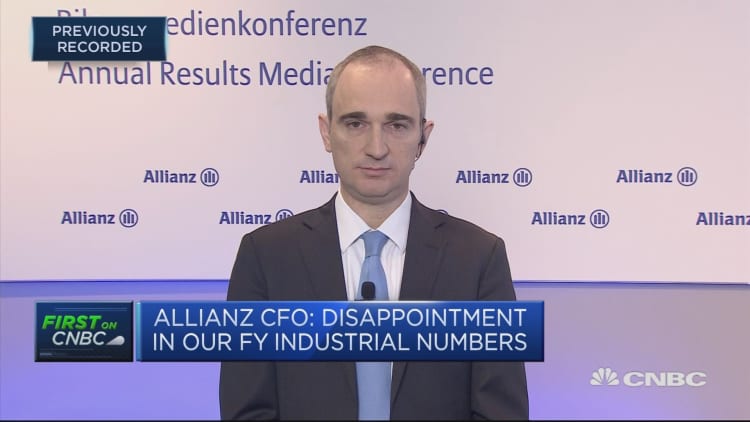Allianz posted a better-than-expected rise in fourth-quarter net profit on Friday, and raised its 2020 guidance.
Quarterly net profit came in at 1.86 billion euros ($2 billion), up 9.5% from the same period last year, with full-year 2019 operating profit hitting 11.9 billion euros, in the upper end of the German insurer's target range.
The company said its increase in operating profit was driven primarily by higher assets under management at U.S. investment manager Pimco, thanks to "strong market effects" and net inflows.
This prompted Allianz to hike its operating profit target to 12 billion euros for 2020, up 4.3% from previous guidance.
However, the group had to set aside 600 million euros in reserves to prop up its struggling corporate business, causing its property and casualty division to miss expectations.

Allianz CFO Giulio Terzariol told CNBC on Friday that this was a "disappointment," but added that the combined ratio —a measure used by insurers, with readings below 100 indicating profitability — for the division was "very stable." In the fourth quarter, the combined ratio slipped by 5.5 percentage points to 99.6%. The company is targeting a combined ratio of 93% by the end of 2021.
Terzariol added that the company had made progress on productivity and this year and next would see further focus on restoring profitability in the industrial business.
Allianz also announced plans to extend its share buyback program by another 1.5 billion euros.
Terzariol told CNBC's "Squawk Box Europe" that the buyback program was essential to maintaining capital discipline within the group.
"It's more about efficient capital deployment, and if you see we have achieved in 2019 an ROE (return on equity) of 13.6%, our earnings per share compared to the level of 2016 are up double-digits, and clearly this is a consequence of good operating performance but also of discipline in capital management, and buybacks are very essential to preserve this discipline in capital management," he said
Terzariol also acknowledged that the group was seeing a slowdown in China as a result of the coronavirus outbreak, but did not expect a material impact on the wider group numbers.

